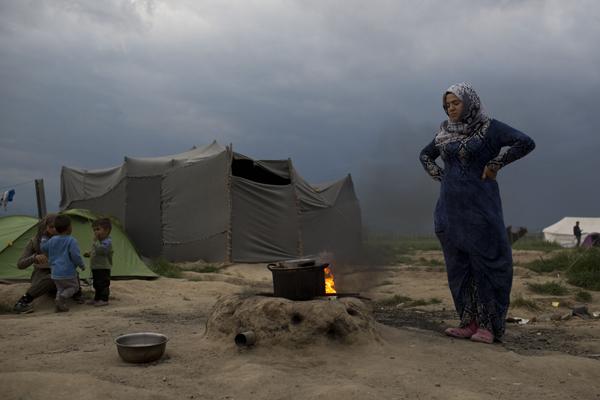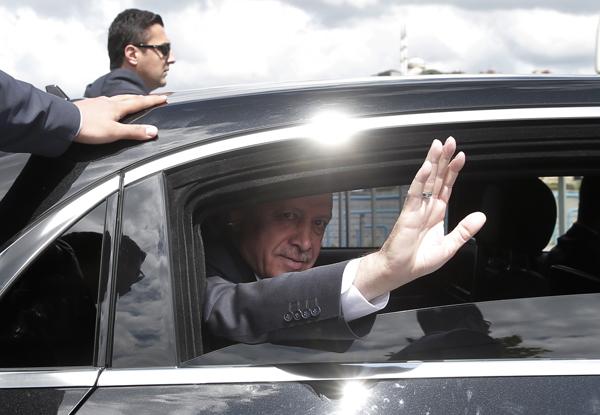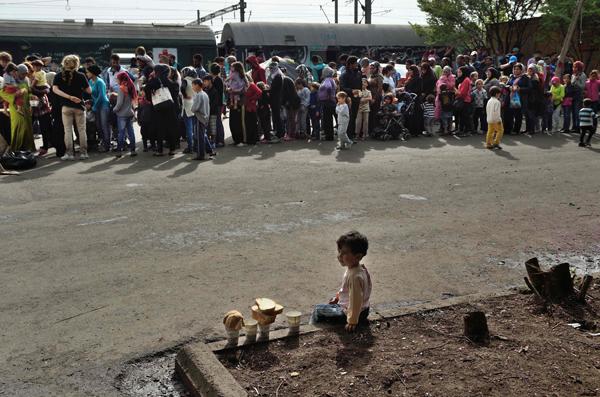You are here
Turkey digs in heels over terrorism law, to EU's chagrin
By Reuters - May 11,2016 - Last updated at May 11,2016

A Syrian woman cooks at the northern Greek border point of Idomeni, Greece, on Tuesday (AP photo)
ANKARA/STRASBOURG — Turkey refused again on Wednesday to make changes to its anti-terrorism laws demanded by Brussels in a hardening of its stance that could jeopardise a major deal with the bloc covering migrants, free travel and militants.
EU officials and rights groups have accused Turkey of using broad anti-terrorism legislation to stifle dissent. Ankara says it needs the laws to battle Kurdish militants at home and threats from the Daesh terror group in neighbouring Iraq and Syria.
Brussels wants Ankara to narrow its legal definition of terrorism and change some other laws to meet EU standards — as part of the wide-ranging deal to secure Turkish help in reducing the flow of migrants into Europe.
But Ankara's minister for EU affairs, Volkan Bozkir, told broadcaster NTV Turkish legislation already met EU standards.
"It is not possible for us to accept any changes to the counter terrorism law," Bozkir said, echoing earlier comments by President Recep Tayyip Erdogan who last week told the European Union: "We're going our way, you go yours."
Bozkir's assertion that there had never been a deal over the laws will upset EU officials already worried by the departure of Prime Minister Ahmet Davutoglu, the main Turkish broker of the deal under which Turkey takes back migrants reaching Europe from its shores in return for concessions including the scrapping of visas for Turks visiting the EU.
Davutoglu announced last week he would step down after weeks of tension with Erdogan.
‘Purely political’
The migration deal has sharply reduced the flow of refugees and migrants after some 1.3 million people passed through Turkey to reach Greece and Italy since the start of 2015.
For many Turks, visa-free travel to Europe is the main reward in the deal. But Turkey has still to meet five of 72 criteria the EU imposed, including the narrower definition of terrorism.
One Erdogan adviser and a member of Turkey's parliament for the ruling AK Party, Burhan Kuzu, tweeted late on Tuesday: "The European Parliament will discuss the report that will open Europe visa-free for Turkish citizens. If the wrong decision is taken, we will send the refugees [back to Europe]."
Many members of the European Parliament, which needs to sign off on visa liberalisation, have criticised the proposal.
"This is not about meeting the criteria or not, it's a purely political process in which the EU has shown it is prepared to go very far in accepting violations of human rights and freedoms," said Malin Bjork, a left-wing Swedish lawmaker.
The parliament's head, Martin Schulz, has said lawmakers will not deal with the proposal before Turkey meets all the criteria, adding he did not see this happening before July.
Several lawmakers said the parliament's stance would eventually hinge on the political call made by EU capitals, which are keen to prevent a repeat of mass arrivals from Turkey.
During a debate in its Strasbourg chamber, members across the political spectrum denounced Erdogan and Turkish "blackmail" over the refugees. Many insisted there could be no visa deal if all criteria are not met. But others also defended the measure as a way to show ordinary Turks that Europe was open to them.
German government spokeswoman Christiane Wirtz said Berlin expected Ankara to meet its side of the migrant accord but declined to speculate on would happen if it did not.
Adding to concerns about Ankara's rights record, the UN High Commissioner for Human Rights, HH Prince Zeid, said on Tuesday he had received "alarming" reports about violations allegedly committed by Turkish security forces in the largely Kurdish southeast during their offensive against militants.
They include reports of unarmed civilians being deliberately shot by snipers and other military, he said.
A spokesman for Turkey's foreign ministry, Tanju Bilgic, rejected the assertions and cited the multiple security threats that Turkey faces, including the Kurdistan Workers Party (PKK), Daesh and the far-left DHKP-C.
"Our country... is taking all measures within the laws to maintain the balance between freedom and security and to protect the lives of our citizens in the region," he said.
Related Articles
ISTANBUL — President Recep Tayyip Erdogan on Tuesday warned the European Union that the Turkish parliament would block laws related to the l
ISTANBUL — Turkish President Recep Tayyip Erdogan on Saturday poured more cold water on hopes for progress with Europe on a deal to curb mig
ISTANBUL — Turkish President Recep Tayyip Erdogan warned the European Union Tuesday it needs Turkey more than Ankara needs the bloc, as tens


















